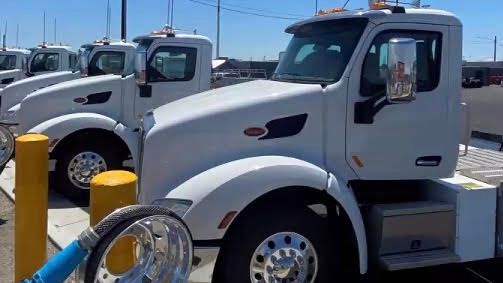LOS ANGELES — Two months after the Ports of Los Angeles and Long Beach began collecting a fee to transition trucks to zero emissions, the so-called Clean Truck Fund is on track to raise $90 million this year.
In April, the two ports collected $9 million from the program, which charges cargo owners $10 for every twenty-foot loaded container unit they haul with a polluting diesel truck, or $20 for every loaded forty-foot unit.
The proceeds will incentivize the purchase of cleaner models powered with batteries or hydrogen fuel cells and to build heavy-duty EV fueling infrastructure.
The ports have been working to transition the cargo trucks that service them since 2006, when the governing boards of the ports approved a Clean Air Action Plan to reduce trucks’ emissions to zero by 2035. More than a decade later, just 31 of the 21,221 trucks currently registered with the ports of LA and Long Beach are zero emissions, according to Port of LA Environmental Affairs Officer Tim DeMoss.
“Our fleet continues to get a little younger, a little cleaner over time,” DeMoss said Wednesday during a Clean Air Action Plan update.
By the end of the year, the port will add another 11 zero-emissions trucks to its cargo fleet. Stricter regulations are also poised to take effect. Starting next January, the California Air Resources Board will prevent diesel engines older than 2010 from servicing the ports. About a quarter of the trucks currently registered with the San Pedro Bay complex are 13 to 15 years old.
Replacing them, however, is an expensive proposition. While the technology is available after decades of development, with multiple manufacturers producing battery-electric heavy-duty trucks, Port of LA Executive Director has said that transitioning the fleet that serves the ports will cost $10 billion.
In March, the Los Angeles Harbor Commission approved the Port of LA’s plan to provide $150,000 vouchers to licensed motor carriers registered to operate at the port to help them purchase zero-emissions trucks that otherwise cost almost twice as much as diesel. Monies from the Clean Truck Fund will also fund the installation of heavy-duty battery chargers and hydrogen fueling infrastructure.



